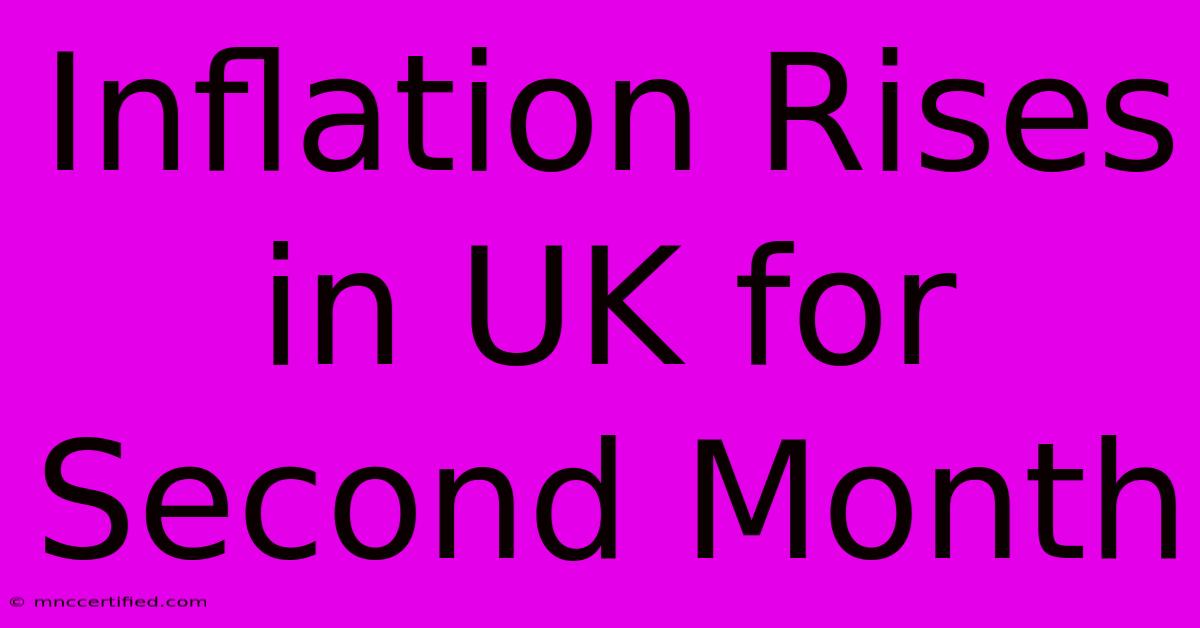Inflation Rises In UK For Second Month

Table of Contents
Inflation Rises in UK for Second Month: What Does it Mean for You?
The UK is grappling with persistent inflation, with the Consumer Prices Index (CPI) rising for a second consecutive month, sparking concerns about the cost of living crisis. This article delves into the reasons behind this worrying trend, its impact on consumers, and potential future implications.
Understanding the Inflation Surge
The latest figures reveal a concerning upward trajectory in inflation, defying predictions of a slowdown. Several factors contribute to this persistent rise:
1. Energy Prices Remain High:
Energy costs continue to be a major driver of inflation. While the initial shock of the energy crisis has eased somewhat, prices remain significantly elevated compared to pre-pandemic levels. This is exacerbated by geopolitical instability and ongoing supply chain disruptions. Understanding the energy market's volatility is crucial to grasping the broader inflationary pressures.
2. Persistent Supply Chain Issues:
Global supply chains are still recovering from the pandemic's impact. Bottlenecks, shortages of raw materials, and increased transportation costs contribute to higher prices for a wide range of goods and services. This is particularly noticeable in sectors like manufacturing and retail. Supply chain resilience is a key factor influencing future inflation rates.
3. Wage Growth and Demand:
While wage growth is increasing in some sectors, it's not keeping pace with inflation. This means that real wages – the purchasing power of earnings – are falling, potentially fueling further demand for higher salaries and further inflationary pressure. The delicate balance between wage growth and inflation is a key economic indicator.
4. Increased Food Prices:
Food prices have risen sharply, reflecting the impact of energy costs, supply chain issues, and unfavorable weather conditions affecting agricultural production. This places significant pressure on household budgets, particularly for low-income families. Food inflation is a critical aspect of the cost of living crisis.
Impact on Consumers and the Economy
The persistent rise in inflation has significant consequences for consumers and the UK economy:
- Reduced Purchasing Power: Higher prices erode consumers' purchasing power, reducing their ability to afford essential goods and services. This can lead to decreased consumer spending and potential economic slowdown.
- Increased Poverty and Inequality: Inflation disproportionately affects low-income households, pushing more people into poverty and exacerbating existing inequalities. Social welfare policies play a critical role in mitigating these effects.
- Uncertainty and Investment: High inflation creates uncertainty for businesses, potentially discouraging investment and hindering economic growth. Business confidence is vital for long-term economic stability.
- Interest Rate Hikes: To combat inflation, the Bank of England may continue to raise interest rates. This can make borrowing more expensive for businesses and consumers, further dampening economic activity. Monetary policy plays a crucial role in managing inflation.
What the Future Holds
Predicting future inflation trends is challenging, but several factors will likely play a key role:
- Global Economic Conditions: Global economic growth and energy prices will significantly influence UK inflation.
- Government Policies: Government interventions, such as energy price caps or targeted support for vulnerable households, can mitigate the impact of inflation. Fiscal policy is an important tool in addressing inflation.
- Bank of England Actions: The Bank of England's monetary policy decisions will play a critical role in determining future inflation rates.
The ongoing inflation in the UK presents significant challenges. Understanding the underlying causes and their impact is crucial for policymakers, businesses, and consumers alike. The coming months will be critical in determining whether the current inflationary pressure can be brought under control. Staying informed about economic indicators and government policies is essential for navigating these uncertain times.

Thank you for visiting our website wich cover about Inflation Rises In UK For Second Month. We hope the information provided has been useful to you. Feel free to contact us if you have any questions or need further assistance. See you next time and dont miss to bookmark.
Featured Posts
-
Water Cuts School Closures Southern Water
Dec 19, 2024
-
Last Words Before Honolulu Crash Revealed
Dec 19, 2024
-
New Masters Degrees At Rockford University
Dec 19, 2024
-
Live Blog Arsenal Crystal Palace Game
Dec 19, 2024
-
Arsenal Vs Palace Jesuss Hat Trick
Dec 19, 2024